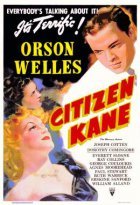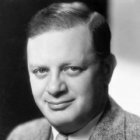
Citizen Kane Page #2
- PG
- Year:
- 1941
- 119 min
- 857,719 Views
The foot of Kane's bed. The camera very close. Outlined
against the shuttered window, we can see a form - the form of
a nurse, as she pulls the sheet up over his head. The camera
follows this action up the length of the bed and arrives at
the face after the sheet has covered it.
FADE OUT:
FADE IN:
INT. OF A MOTION PICTURE PROJECTION ROOM
On the screen as the camera moves in are the words:
"MAIN TITLE"
Stirring, brassy music is heard on the soundtrack (which, of
course, sounds more like a soundtrack than ours.)
The screen in the projection room fills our screen as the second
title appears:
"CREDITS"
NOTE:
Here follows a typical news digest short, one of theregular monthly or bi-monthly features, based on public events
or personalities. These are distinguished from ordinary
newsreels and short subjects in that they have a fully developed
editorial or storyline. Some of the more obvious
characteristics of the "March of Time," for example, as well
as other documentary shorts, will be combined to give an
authentic impression of this now familiar type of short subject.
As is the accepted procedure in these short subjects, a narrator
is used as well as explanatory titles.
FADE OUT:
NEWS DIGEST NARRATOR
Legendary was the Xanadu where
Kubla Kahn decreed his stately
pleasure dome -
(with quotes in his
voice)
"Where twice five miles of fertile
ground, with walls and towers were
girdled 'round."
(DROPPING THE QUOTES)
Today, almost as legendary is
Florida's XANADU - world's largest
private pleasure ground. Here, on
the deserts of the Gulf Coast, a
private mountain was commissioned,
successfully built for its landlord.
Here in a private valley, as in
the Coleridge poem, "blossoms many
an incense-bearing tree." Verily,
"a miracle of rare device."
U.S.A.
CHARLES FOSTER KANE
Opening shot of great desolate expanse of Florida coastline
(1940 - DAY)
DISSOLVE:
Series of shots showing various aspects of Xanadu, all as they
might be photographed by an ordinary newsreel cameraman - nicely
photographed, but not atmospheric to the extreme extent of the
Prologue (1940).
NARRATOR:
(dropping the quotes)
Here, for Xanadu's landlord, will
be held 1940's biggest, strangest
funeral; here this week is laid to
rest a potent figure of our Century -
America's Kubla Kahn - Charles
Foster Kane. In journalism's
history, other names are honored
more than Charles Foster Kane's,
more justly revered. Among
publishers, second only to James
Gordon Bennet the First: his
dashing, expatriate son; England's
Northcliffe and Beaverbrook;
Chicago's Patterson and McCormick;
TITLE:
TO FORTY-FOUR MILLION U.S. NEWS BUYERS, MORE NEWSWORTHY THAN
THE NAMES IN HIS OWN HEADLINES, WAS KANE HIMSELF, GREATEST
NEWSPAPER TYCOON OF THIS OR ANY OTHER GENERATION.
Shot of a huge, screen-filling picture of Kane. Pull back to
show that it is a picture on the front page of the "Enquirer,"
surrounded by the reversed rules of mourning, with masthead
and headlines. (1940)
DISSOLVE:
A great number of headlines, set in different types and
different styles, obviously from different papers, all
announcing Kane's death, all appearing over photographs of
Kane himself (perhaps a fifth of the headlines are in foreign
languages). An important item in connection with the headlines
is that many of them - positively not all - reveal passionately
conflicting opinions about Kane. Thus, they contain variously
the words "patriot," "democrat," "pacifist," "war-monger,"
"traitor," "idealist," "American," etc.
TITLE:
1895 TO 1940 - ALL OF THESE YEARS HE COVERED, MANY OF THESE
YEARS HE WAS.
Newsreel shots of San Francisco during and after the fire,
followed by shots of special trains with large streamers: "Kane
Relief Organization." Over these shots superimpose the date -
1906.
Artist's painting of Foch's railroad car and peace negotiators,
if actual newsreel shot unavailable. Over this shot
sumperimpose the date - 1918.
NARRATOR:
Denver's Bonfils and Sommes; New
York's late, great Joseph Pulitzer;
America's emperor of the news
syndicate, another editorialist
and landlord, the still mighty and
once mightier Hearst. Great names
all of them - but none of them so
loved, hated, feared, so often
spoken - as Charles Foster Kane.
The San Francisco earthquake.
First with the news were the Kane
papers. First with Relief of the
Sufferers, First with the news of
their Relief of the Sufferers.
Kane papers scoop the world on the
Armistice - publish, eight hours
before competitors, complete details
of the Armistice teams granted the
Germans by Marshall Foch from his
railroad car in the Forest of
Compeigne. For forty years appeared
in Kane newsprint no public issue
on which Kane papers took no stand.
No public man whom Kane himself
did not support or denounce - often
support, then denounce. Its humble
beginnings, a dying dailey -
Translation
Translate and read this script in other languages:
Select another language:
- - Select -
- 简体中文 (Chinese - Simplified)
- 繁體中文 (Chinese - Traditional)
- Español (Spanish)
- Esperanto (Esperanto)
- 日本語 (Japanese)
- Português (Portuguese)
- Deutsch (German)
- العربية (Arabic)
- Français (French)
- Русский (Russian)
- ಕನ್ನಡ (Kannada)
- 한국어 (Korean)
- עברית (Hebrew)
- Gaeilge (Irish)
- Українська (Ukrainian)
- اردو (Urdu)
- Magyar (Hungarian)
- मानक हिन्दी (Hindi)
- Indonesia (Indonesian)
- Italiano (Italian)
- தமிழ் (Tamil)
- Türkçe (Turkish)
- తెలుగు (Telugu)
- ภาษาไทย (Thai)
- Tiếng Việt (Vietnamese)
- Čeština (Czech)
- Polski (Polish)
- Bahasa Indonesia (Indonesian)
- Românește (Romanian)
- Nederlands (Dutch)
- Ελληνικά (Greek)
- Latinum (Latin)
- Svenska (Swedish)
- Dansk (Danish)
- Suomi (Finnish)
- فارسی (Persian)
- ייִדיש (Yiddish)
- հայերեն (Armenian)
- Norsk (Norwegian)
- English (English)
Citation
Use the citation below to add this screenplay to your bibliography:
Style:MLAChicagoAPA
"Citizen Kane" Scripts.com. STANDS4 LLC, 2025. Web. 18 Jan. 2025. <https://www.scripts.com/script/citizen_kane_59>.



Discuss this script with the community:
Report Comment
We're doing our best to make sure our content is useful, accurate and safe.
If by any chance you spot an inappropriate comment while navigating through our website please use this form to let us know, and we'll take care of it shortly.
Attachment
You need to be logged in to favorite.
Log In